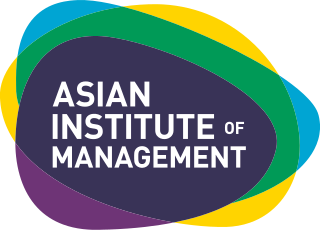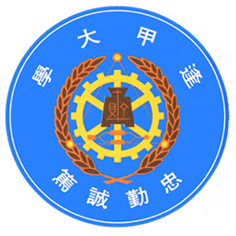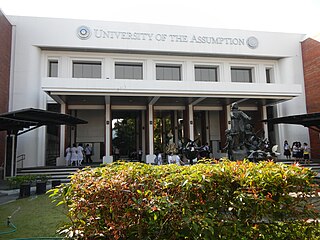The Xavier University – Ateneo de Cagayan, also known simply as the Ateneo de Cagayan or Xavier is a private, Catholic, coeducational, basic and higher education institution. It is operated by the Philippine Province of the Society of Jesus in Cagayan de Oro, Misamis Oriental, Philippines. Founded in 1933 as the Ateneo de Cagayan, it became the first higher education institution in Mindanao to receive a university status a year before its sister school Ateneo de Manila. It was given its present name in honor of the Jesuit missionary St. Francis Xavier.

The University of the Philippines Diliman, also referred to as UP Diliman or simply University of the Philippines (UP), is a public, coeducational, research university located in Diliman, Quezon City, Philippines. It was established on February 12, 1949, as the flagship campus and seat of administration of the University of the Philippines System, the premier and national university of the Philippines.
The Walter A. Haas School of Business is the business school of the University of California, Berkeley, a public research university in Berkeley, California. It was the first business school at a public university in the United States.

The Dongbei University of Finance and Economics is a provincial public university in Dalian, Liaoning, China. Home to over 20,000 students, it is one of the oldest and largest modern universities in Dalian.

Yeungnam University is a private research university located in Gyeongsan, North Gyeongsang, South Korea. The university's predecessors, Taegu College and Chunggu College, were founded in Daegu in 1947 and 1950 respectively. In 1967, the two colleges were merged by President Park Chung Hee to form Yeungnam University. In 1972, the university's new main campus opened in Gyeongsan east of Daegu. The university includes colleges of Law and Medicine as well as a university hospital. It ranked 1st in the rate for passing the bar exam for the second straight year (2015~2016), it also ranked 6th in providing CEOs in Korea's top 100 companies (2015), and 6th in providing the CEOs in Companies listed on KOSDAQ (2014). Yeungnam University is ranked 501 in the Academic Ranking of World Universities by Shanghai Jiao Tong University.

King Mongkut's Institute of Technology Ladkrabang is a research and educational institution in Thailand. It is situated in Lat Krabang District, Bangkok approximately 30 km east of the city center. The university consists of nine faculties: engineering, architecture, science, industrial education and technology, agricultural technology, information technology, food industry, liberal arts, and medicine.

The University of San Carlos is a private, Catholic, research, coeducational basic and higher education institution administered by the Philippine Southern Province of the Society of the Divine Word missionaries in Cebu City, Philippines, since 1935. It offers basic education and higher education. Founded originally in 1595 as Colegio de San Ildefonso, it later became the Colegio-Seminario de San Carlos in 1783 and finally obtained university charter in 1948.

Erasmus University Rotterdam is a public research university located in Rotterdam, Netherlands. The university is named after Desiderius Erasmus Roterodamus, a 15th-century Christian humanist and theologian.

The Asian Institute of Management (AIM) is a management school and research institution in Makati, the Philippines. Established in partnership with Harvard Business School, it is one of the few business schools in Asia to be internationally accredited with the Association to Advance Collegiate Schools of Business (AACSB). Stephen H. Fuller of the Harvard Business School was its first president. It was described by Asiaweek magazine as the best in the Asia-Pacific region in terms of executive education.

Feng Chia University is a private research university in Taiwan, located in Taichung. It was named after Chiu Feng-Chia one of the leaders of the military resistance against the Japanese invasion of Taiwan in 1895.

The University of the Assumption (U.A.) is a private archdiocesan Catholic university in the City of San Fernando, Pampanga, Philippines. The University of the Assumption is the first Catholic archdiocesan university in the Philippines and in Asia. It is among the top schools in the region, based on its accredited programs, and licensure and professional examination results.

The Technological University of the Philippines, commonly known as TUP, is a coeducational state university in the Philippines. It was established in 1901 by the Philippine Commission. TUP has its main campus in Manila and satellite campuses in Taguig, Cavite, Visayas, Batangas, and Quezon.
KIMEP University is a private university founded in 1992 in Almaty, Kazakhstan.

The Philippine Women's University (PWU) is a coeducational tertiary education school which has its main campus in Manila, Philippines. An institution exclusive for girls from its inception until the 1970s, the PWU now admits both women and men as its students.
Jesus P. Estanislao is a Filipino economist best known for having been the 6th Socio-economic Planning Secretary and concurrent Director-General of the National Economic and Development Authority (NEDA) from 1989-1990, and Secretary of Finance of the Philippines from 1990-1992, during the government of President Corazon Aquino. He presently heads two private institutes committed to governance reforms: the Institute of Corporate Directors, and the Institute for Solidarity in Asia. He also chairs the President's Governance Advisory Council, which advises the Philippine President on governance issues.

The University of Eastern Philippines is the first state university in the Visayas. It offers the largest number of undergraduate and graduate degree programs and short-term courses and certificates among the higher education institutions in the Eastern Visayas region. Its flagship campus is in Catarman, Northern Samar.
Bernardo Malvar Villegas is a Filipino economist and writer best known for being one of the framers of the 1987 Philippine Constitution, for authoring a number of widely used Philippine economics textbooks, and for his role in the founding of two influential Philippine business organizations, the Center for Research and Communication and the Makati Business Club.

Far Eastern University, also referred to by its acronym FEU, is a private research non-sectarian university in Manila, Philippines. Created by the merger of Far Eastern College and the Institute of Accounts, Business and Finance, FEU became a university in 1934 during the term of its first president, Nicanor Reyes Sr.
Placido "Cidito" Ledesma Mapa Jr. a Filipino businessman, economist, and government official best known for having served as the second head of the National Economic and Development Authority (NEDA), which is the Philippines' highest economic and development planning body. He was once governor of the Development Bank of the Philippines (DBP). He also held the position of Alternate Executive Director for the Philippines of the International Monetary Fund. He was President of the Philippine Economic Society from 1965 to 1966.
Griffith Business School is part of Griffith University, located in South-East Queensland, Australia. It is a public university with more than 43,000 students circa 2015.

















